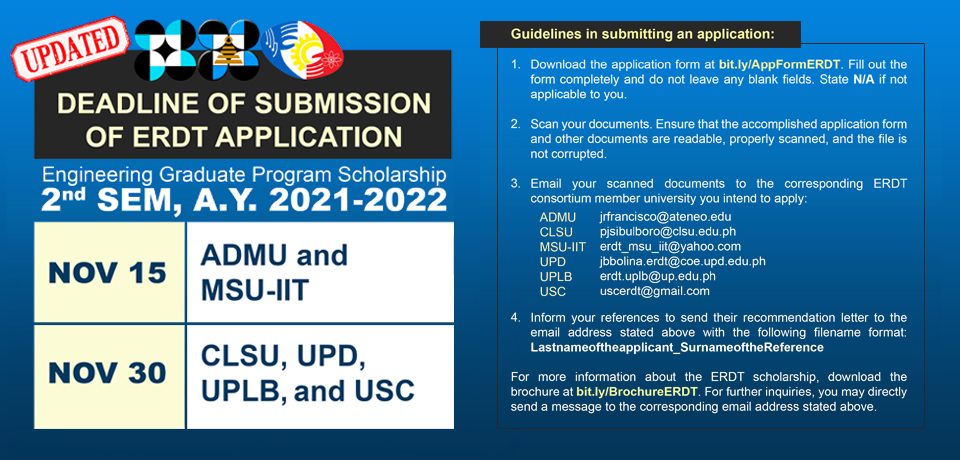2nd ERDT Coference
ERDT CONSORTIUM HOLDS SECOND ERDT CONFERENCE*
Kim Quilinguing
Dr. Guevara stressed the importance of high-level engineering research and development for technology in addressing national issues including economic growth. This is something the Department of Science and Technology (DOST) and the legislature, through its Commission on Science and Technology and Engineering (COMSTE), have acknowledged through their support to the ERDT program.
In his remarks, DOST Undersecretary Fortunato de la Peña added that the ERDT is instrumental in the adoption of a national science and technology plan that will cover engineering, manufacturing, and even health care. He underscored the importance of engineering research and development in increasing productivity in agriculture, construction, and industrial production.
In 2009, the COMSTE and the ERDT sought to pursue projects in emerging fields of engineering and science and technology (EST) while promoting innovation. According to COMSTE Semiconductors and Electronics Panel Chair Dr. Gregory Tangonan, innovation has resulted in the increase of scientific output in solar power-generation, bio-ethanol production, and biomedical research.
“We should make engineering research and development work for our country,”
-UP College of Engineering Dean Rowena Cristina Guevara as head of the Engineering Research and Development for Technology (ERDT) at its second conference titled “Synergy in Multidisciplinary R&D” at the Diamond Hotel, Manila, on February 20, 2009.
Specific Directions for 2009
COMSTE is an organization composed of some members of the House of Representatives, the Senate, and highly qualified experts in various fields in science and technology. It reviews educational programs and curriculum, establishes networks among scientific and technological communities, and seeks funding for EST research and development. With topics ranging from increased food production to low cost energy production, the different panels of the COMSTE reached the following suggestions:
- Dr. William Padolina, chair of the Agriculture and Food Panel, emphasized the importance of studies on agricultural gene technology, which can lead to optimal food production.
- Health Sciences Panel Chair and UP Manila Chancellor Ramon Arcadio suggested going into new concepts in health sciences, such as e-learning for health, digitized health records, tele-mentoring in medical transcription and health practices, portable diagnostic kits, and new vaccines. He said ERDT could also go into the development of new medicines from indigenous plants and endemic orgasms.
- From the Energy and Environment Panel, Dr. Alvin Culaba pointed to efficient and cost-effective electricity production, and alternative energy sources, such as bio-gas, local coal, bio-ethanol, solar, wind, and ocean energy.
- Joaquin Quintos IV, chair of the Information and Technology and IT-Enabled Panel Chair, emphasized the need for advanced value-added information and communications technology output.
- Science and Math and Engineering and Education Panel Chair Reynaldo Vea cited a study conducted in the US on Asian-Americans, which found that Vietnamese and Filipinos are not too interested in pursuing graduate studies. Vea said Filipinos should view port-graduate education as important in making the country globally competitive. He was, however, quick to add that the development of highly skilled engineers and scientists starts with developing the youth’s interest in engineering research and development and in science and technology.
According to Dr. Guevara, the DOST, through the Science Education Institute (DOST-SEI), has released P202 million to the ERDT for 33 research and development projects. The consortium currently has 152 Master of Science scholars, 34 Ph.D. scholars, 11 visiting professors, and 1 visiting researcher. In 2009, the consortium planned to increase the numbers to 171 Master of Science scholars, 19 visiting professors, and 14 visiting researchers; and have 10 Ph.D. “sandwich” scholars, 17 foreign doctoral, and five post-doctoral scholars. These scholarships are given to individuals who have shown exceptional abilities and dedication to their chosen fields in engineering. The ERDT hopes to conduct more conferences that will enable its members to exchange information and technologies essential to the studies being undertaken. It also hopes to develop and conduct “techno-preneurship” or technological-entrepreneurship classes and make a benchmark of technological business incubators based on international standards.
The consortium provides scholarships for graduate studies in engineering and science and technology and pursues research studies for technological advancement. It has identified energy, environment and infrastructure, information and communications technology, and semiconductor and electronics as its major thrusts. It aims to produce a critical mass of highly-skilled researchers, scientists, and engineers vital to national development because of their capability to translate R&D results into viable industries, undertake high-impact research, pass on knowledge, and identify new S&T directions.
*2nd ERDT Conference “Synergy in Multi-disciplinary R&D”, February 20, 2009; Diamond Hotel, Manila, Philippines


